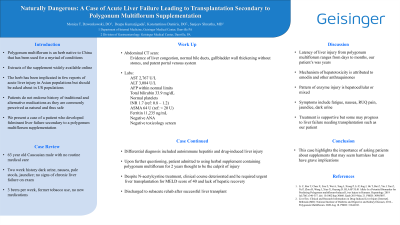Sunday Poster Session
Category: Liver
P1114 - Naturally Dangerous: A Case of Acute Liver Failure Leading to Transplantation Secondary to Polygonum Multiflorum Supplementation
Sunday, October 22, 2023
3:30 PM - 7:00 PM PT
Location: Exhibit Hall

Has Audio

Monica Dzwonkowski, DO
Geisinger Medical Center
Danville, PA
Presenting Author(s)
Monica Dzwonkowski, DO, Deepa Kumarjiguda, DO, Konstantinos Damiris, DO, Sanjeev Shrestha, MD
Geisinger Medical Center, Danville, PA
Introduction: Polygonum multiflorum, an herb native to China, has been used for centuries for a myriad of conditions. The unregulated extracts are widely available online. The herb has been implicated in a few reports of acute liver injury in Asian populations, but is also an important supplement to ask patients about in the United States. Patients tend to not endorse history of use of these traditional and alternative medications as they are commonly perceived as natural and thus safe products. We present a patient with fulminant liver failure secondary to polygonum multiflorum supplementation who required urgent orthotopic liver transplantation.
Case Description/Methods: A 63-year-old Caucasian male with no routine medical care presented with two weeks of dark urine, nausea, pale stools, and jaundice. He reported drinking 3 beers per week, former tobacco use, and no new medications. He had no signs of chronic liver failure on examination. Abdominal CT showed evidence of liver congestion with normal bile ducts, gallbladder wall thickening without stones, and patent portal venous system. Labs revealed AST 2,767 U/L, ALT 3,084 U/L, total bilirubin 33.9 mg/dL, normal platelets, INR 1.7 (ref: 0.8-1.2), normal AFP, ASMA 64 U (ref: < 20 U), ferritin 11,235 ng/mL, negative ANA, and negative toxicology screening. Differential diagnosis included autoimmune hepatitis versus drug induced liver injury.
Upon further questioning, the patient admitted he had been taking an herbal supplement containing polygonum multiflorum for 2 years for overall wellness, which was thought to be the culprit of his liver injury. Despite treatment with N-acetylcystine, his clinical course deteriorated, requiring urgent liver transplantation due to MELD score of 40 and lack of hepatic recovery. After a successful transplant, he was discharged to a subacute rehab and advised to stop his supplement.
Discussion: The latency of liver injury from polygonum multiflorum ranges from days to months, our patient’s was years. The mechanism of hepatotoxicity from the supplement is attributed to emodin and other anthraquinones. The pattern of enzyme injury is hepatocellular or mixed. Symptoms include fatigue, nausea, right upper quadrant pain, jaundice, and dark urine. Treatment is supportive but some patients may require urgent liver transplantation, as was the case with our patient. This case highlights the importance of asking patients about supplements that may seem harmless to patients but can have grave implications.
Disclosures:
Monica Dzwonkowski, DO, Deepa Kumarjiguda, DO, Konstantinos Damiris, DO, Sanjeev Shrestha, MD. P1114 - Naturally Dangerous: A Case of Acute Liver Failure Leading to Transplantation Secondary to Polygonum Multiflorum Supplementation, ACG 2023 Annual Scientific Meeting Abstracts. Vancouver, BC, Canada: American College of Gastroenterology.
Geisinger Medical Center, Danville, PA
Introduction: Polygonum multiflorum, an herb native to China, has been used for centuries for a myriad of conditions. The unregulated extracts are widely available online. The herb has been implicated in a few reports of acute liver injury in Asian populations, but is also an important supplement to ask patients about in the United States. Patients tend to not endorse history of use of these traditional and alternative medications as they are commonly perceived as natural and thus safe products. We present a patient with fulminant liver failure secondary to polygonum multiflorum supplementation who required urgent orthotopic liver transplantation.
Case Description/Methods: A 63-year-old Caucasian male with no routine medical care presented with two weeks of dark urine, nausea, pale stools, and jaundice. He reported drinking 3 beers per week, former tobacco use, and no new medications. He had no signs of chronic liver failure on examination. Abdominal CT showed evidence of liver congestion with normal bile ducts, gallbladder wall thickening without stones, and patent portal venous system. Labs revealed AST 2,767 U/L, ALT 3,084 U/L, total bilirubin 33.9 mg/dL, normal platelets, INR 1.7 (ref: 0.8-1.2), normal AFP, ASMA 64 U (ref: < 20 U), ferritin 11,235 ng/mL, negative ANA, and negative toxicology screening. Differential diagnosis included autoimmune hepatitis versus drug induced liver injury.
Upon further questioning, the patient admitted he had been taking an herbal supplement containing polygonum multiflorum for 2 years for overall wellness, which was thought to be the culprit of his liver injury. Despite treatment with N-acetylcystine, his clinical course deteriorated, requiring urgent liver transplantation due to MELD score of 40 and lack of hepatic recovery. After a successful transplant, he was discharged to a subacute rehab and advised to stop his supplement.
Discussion: The latency of liver injury from polygonum multiflorum ranges from days to months, our patient’s was years. The mechanism of hepatotoxicity from the supplement is attributed to emodin and other anthraquinones. The pattern of enzyme injury is hepatocellular or mixed. Symptoms include fatigue, nausea, right upper quadrant pain, jaundice, and dark urine. Treatment is supportive but some patients may require urgent liver transplantation, as was the case with our patient. This case highlights the importance of asking patients about supplements that may seem harmless to patients but can have grave implications.
Disclosures:
Monica Dzwonkowski indicated no relevant financial relationships.
Deepa Kumarjiguda indicated no relevant financial relationships.
Konstantinos Damiris indicated no relevant financial relationships.
Sanjeev Shrestha indicated no relevant financial relationships.
Monica Dzwonkowski, DO, Deepa Kumarjiguda, DO, Konstantinos Damiris, DO, Sanjeev Shrestha, MD. P1114 - Naturally Dangerous: A Case of Acute Liver Failure Leading to Transplantation Secondary to Polygonum Multiflorum Supplementation, ACG 2023 Annual Scientific Meeting Abstracts. Vancouver, BC, Canada: American College of Gastroenterology.
